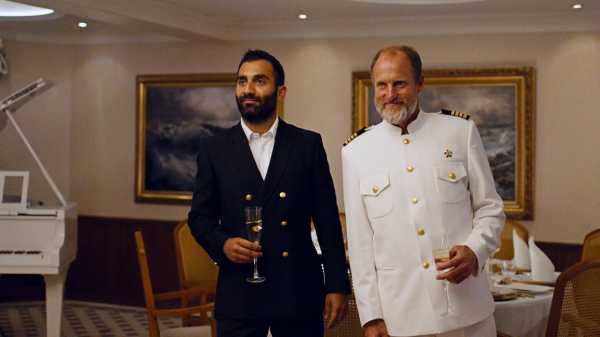
There have been several cultural texts recently that depict the coddled super-rich and the underclass that scrambles to serve them in exchange for crumbs of their plenty. On HBO, we’ve had Jesse Armstrong’s “Succession,” a romp about a Murdochian family, and Julian Fellowes’s enjoyably stately Mrs. Astor’s Four Hundred period-porn series, “The Gilded Age.” On Bravo and Netflix, a whole slew of reality series have examined the one per cent’s exacting demands in everything from real estate (“Selling Sunset”) to luxury yachting (the “Below Deck” franchise). Some of the shows, particularly the scripted dramas that whisk their characters away to some kind of high-end resort—Hulu’s “Nine Perfect Strangers,” HBO’s “The White Lotus”—have been especially scathing. But “Triangle of Sadness,” the new black comedy from the Swedish director Ruben Östlund, might be the one to go the hardest. The movie follows a group of wealthy Europeans being waited on hand and foot as they vacation on a superyacht, until a series of disasters, natural and otherwise, brings the class tensions simmering beneath the surface to a violent fever pitch.
Halfway through the film, the shit literally hits the fan. A storm pummels the ship while the guests are eating dinner, turning the yacht into a de-facto vomitorium, as seasick passengers chase haute-cuisine delicacies and flutes of champagne with spots of projectile hurling. Östlund takes his time with this episode, showing the chunks fly, for maximum comic and gross-out effect. (It’s probably the most vomit that I’ve seen onscreen since the pie-contest scene in Rob Reiner’s 1986 movie, “Stand by Me.”) The scene is set to a blaring track from the hardcore Swedish band Refused, with the coup de grâce arriving as the toilets on the yacht overflow, sending rivers of runny excrement coursing through the hallways and down the boat’s steps, drenching the passengers. Meanwhile, the boat’s drunken captain, a self-proclaimed Marxist (Woody Harrelson, having a great time), commandeers the P.A. system. “While you’re swimming in abundance, the rest of the world is drowning in misery,” he rants. The guests are, at this point, virtually swimming in their own poop.
A frequent critique of “Triangle of Sadness,” which won the Palme d’Or at this year’s Cannes festival, is that it’s too on the nose. My colleague Richard Brody has suggested that the movie engages in “political bombast” and “targeted demagogy,” missing the mark of a subtler statement with its easy sloganeering and facile reversals. It’s true that the movie is somewhat of an obvious, too-symmetrical parable, with the weak and indigent coming to haunt those who have done everything in their power to oppress and then repress them. But, as I watched, I kept thinking to myself, Show me the lie. The willful obliviousness of the ultra-wealthy is something that we see and experience and become numb to on a daily basis. And it felt good to see Östlund take this to task brutally and hilariously. The crudity is part of the point. One could watch “The White Lotus” and conceivably ignore its social-satire element, revelling instead in its beautiful scenery, sexy couplings, and plot intricacies. In comparison, the political message in “Triangle of Sadness” is like a hammer to the head. It’s a tactic worthy of 2022, a time in which climate-change activists attempt to apprise the public of their cause by tossing mashed potatoes at a Monet. But, unlike this gambit, which can feel inexplicable—Why mashed potatoes? Why Monet?—Östlund earns our attention with his transparent tack, and by making an extremely entertaining, even poignant movie. “Triangle of Sadness” is both the mashed potatoes and the Monet.
The film opens on the story of Carl and Yaya, a model/influencer couple. We see Carl (Harris Dickinson), who is buff, blond, and handsome, fail to impress the casting agents while auditioning for a modelling gig; one of them asks him to “relax your triangle of sadness”—the furrowed area between his brows, which people often smooth out with Botox. Yaya (the lovely Charlbi Dean, who sadly died earlier this year), is the more successful of the pair. And yet, when the two are at a restaurant and the check comes, she expects Carl to pay the bill. Yaya tells him that she aspires to be a “trophy wife.” Their relationship, too, is not really about love, she continues; rather, it is “good for business.” That is, it works according to the logic of brand collaboration: two pretty people on an Instagram feed, after all, attract more followers than one. Carl, however, resists this mercenary logic. “I’d like to put a bet on that,” he tells a dubious Yaya. “I’ll make you love me. It’ll be real love as well. . . . You’ll forget about this trophy shit.”
What Carl calls “this trophy shit” is, of course, related to Yaya’s desire to be a kept woman, but, in the cosmology of the movie, the term can also extend beyond its immediate meaning. “Triangle of Sadness,” at its core, is a film about both trophies and shit, and about how these two categories, of the haves and have-nots, are mutually, hopelessly imbricated. In Östlund’s conception, the entirety of contemporary life has become structured according to the unequal, savage logic wrought by capitalism, a fact that is barely occluded by the blandly sleek, comforting banalities that capitalism itself produces. It is a world in which fewer and fewer people can get trophies, and so ever more people must get shit.
For Carl and Yaya, one trophy—or perk—is an all-expenses-paid cruise on a luxury superyacht. But, despite the opulent environment, the atmosphere is snoozy, unsexy; the guests on board, albeit wealthy, are largely elderly and often grotesque. (I kept flashing back to a 2018 incident in which the then eighty-six-year-old Rupert Murdoch was airlifted off his son Lachlan’s yacht, after taking a fall on it and injuring his back.) “Aren’t you going to eat the pasta?” a rumpled Russian mogul named Dimitry (the excellent Zlatko Burić) asks Yaya, as Carl snaps photos of her in the yacht’s dining room, with a forkful of spaghetti raised to her mouth. “It’s just for the pictures,” Carl tells Dimitry, who seems amused by the concept of influencers. “The looks pay for the tickets. Not bad, huh?” Dimitry muses. He himself, he explains to the couple, is a fertilizer king, who built his empire around the time of the Soviet Union’s collapse. “I sell shit,” he sums up, cheerfully. Dimitry is a lot more honest than most of the other guests: if money comes from shit, whether literally or figuratively, much effort usually goes into concealing and sanitizing this fact. (“Our products have been employed in upholding democracy all over the world,” a British arms manufacturer tells Carl and Yaya, at dinner.) As an influencer, Yaya is an expert in camouflaging unsightly realities, displaying her life to others via the mediation of a screen. Life on the boat is made similarly gauzy, as if seen through a flattering Instagram filter.
Östlund delights in picking off these layers, one by one. At the outset of the cruise, we see Paula (Vicki Berlin), the yacht’s chief of staff, hold a pep talk for her crew of well-scrubbed stewards, all of them white and conventionally attractive. (The mechanics and maids, most of whom seem to be East Asian and Filipino, are lower on the totem pole, and deeper in the ship’s bowels.) They must never refuse a guest’s request, Paula says, no matter how absurd or illegal it might seem. “Try to remind yourself, if everything goes well, at the end of the cruise, you might be getting a very. Generous. Tip!” she cries, as the crew erupts into rhythmic chants of “Money! Money!” Later, Dimitry’s wife, in a show of faux egalitarianism, makes a resistant crew member get into the hot tub, mid-shift. (“Everyone is equal!” she says. “I command you, enjoy the moment!”) The scene brings to mind a crazed Roman emperor settling back to watch his gladiators immolating.
After the storm hits, Dimitry joins the captain at the P.A. system, to provide us with some words of wisdom. “Shit,” he says, upon picking up the microphone. “Shit,” he repeats, sonorously, and the word echoes through the ship, as if it weren’t clear to us before what the movie was trying to tell us. The captain piles on, reading out passages from Chomsky and from his own socialist writings. “I’m not angry with you,” he tells the passengers. “I understand that your greedy behavior is just a way to preserve . . . that you’re rich, filthy rich.” There is a cheeky self-awareness here, as if Östlund knows that, just as the ship’s guests are forced to listen to the captain and take his words in, whether they like it or not, the theatregoers, too, serve as the director’s captive audience.
There is also a measure of self-critique. The captain admits that he’s a “shit socialist”—he does, after all, elaborately cater to the whims of crooked titans of industry on his vessel—and one could say something similar of Östlund, who isn’t fully detached from the world that he condemns. How could he be? (His film received an eight-minute standing ovation at Cannes.) In one scene, we see what lengths are taken to coddle guests on the cruise, when a suitcase packed with jars of Nutella is dropped by a helicopter in the waters near the yacht. A speedboat is sent to retrieve the precious cargo, which is then carried to the kitchen. Östlund’s shots, which switch between multiple perspectives—from within the helicopter, then from the vantage of the speedboat, then tracking the stewardess carrying the goods—showcase the director’s baroque efforts to make his film, seemingly with no expense spared.
In the third and final part of the movie, after the storm and, later, a pirate attack, a handful of the boat’s passengers, including Yaya and Carl, wash up on the shores of a desert island. At this point, the movie becomes something of a Brechtian learning play, a thought experiment in what happens when roles are reversed, and power and its signifiers shift. (Crucially, they never disappear.) Much like the chamber theatre of Erich von Stroheim’s “Greed” (1924)—whose final scene sees the two protagonists battle in the desert for a sack of money even after their water drains into the sand—in Östlund’s film, Rolex and Patek Philippe are suddenly worth nothing against packets of chips and pretzel sticks. Carl, having once resisted Yaya’s demand to be a kept woman, becomes a kept man, though the stakes on the island are those of bare survival; in this topsy-turvy reality, Abigail (Dolly de Leon), the ship’s Filipino toilet manager, gets to keep him, because her subsistence skills are more valuable than Yaya’s influencer good looks. “In the yacht, toilet manager; here, captain,” Abigail says. The others understand her loud and clear. ♦
Sourse: newyorker.com






